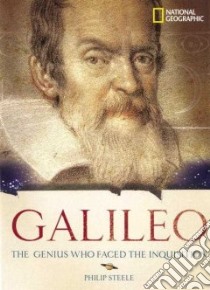Galileo - 9780792236573
Un libro in lingua di Philip Steele edito da Natl Geographic Soc Childrens books, 2005
- € 29.30
- Il prezzo è variabile in funzione del cambio della valuta d’origine
Galileo made the first effective use of the refracting telescope to discover important new facts about astronomy. He also discovered the law of falling bodies as well as the law of the pendulum. Galileo designed a variety of scientific instruments. He also developed and improved the refracting telescope, though he did not invent it. Galileo was born in Pisa in 1564. His father was determined that his son should be a doctor. But Galileo was never really interested in medicine-he discovered he had a talent for mathematics. In 1589 a position as a professor of mathematics required Galileo to teach courses in astronomy. Preparing for these courses deepened Galileo's understanding of astronomical theory. He became convinced of the truth of the theory, proposed by the Polish astronomer Copernicus, that all planets, including the earth, revolve around the sun.This was contrary to Ptolomy's well-established scientific model which seemed to prove that earth was the center of the universe. After building his first telescope in 1609, Galileo discovered that the moon was not smooth, but mountainous and pitted, much like earth. He also discovered four moons circling Jupiter. He made observations of sunspots, and of Venus. Galileo also pursued research on motion-working to develop a theory of motion consistent with a moving earth. In 1616, Galileo was summoned to Rome, charged by the church with heresy because of his adherence to Copernican theory. Church doctrine held that earth was the center of the universe. Although cleared of the charges, he was admonished not to treat Copernicus's theory as if it were true. Nevertheless, Galileo continued to publish works demonstrating that the Copernican system was logically superior to earlier theories. He was summoned to Rome again in 1633. This time he was found guilty, forced to retract his findings, and sentenced to life imprisonment. Because of Galileo's advanced age and poor health, he was allowed to serve out his sentence under house arrest in relative isolation at a villa outside Florence. He died there in 1642. Some 350 years later, in 1992, Pope John Paul II declared that the church had made a mistake in condemning Galileo. Galileo's genius lay in the way he approached scientific problems. First, he reduced those problems to very simple terms on the basis of everyday experience and common-sense logic. Then he analyzed and resolved the problems according to simple mathematical descriptions, thus opening the way for the development of modern mathematical physics.
Informazioni bibliografiche
- Titolo del Libro in lingua: Galileo
- Sottotitolo: The Genius Who Faced The Inquisition
- Lingua: English
- Autore: Philip Steele
- Editore: Natl Geographic Soc Childrens books
- Collana: Natl Geographic Soc Childrens books (Library)
- Data di Pubblicazione: 08 Novembre '05
- Genere: JUVENILE NONFICTION
- Argomenti : Astronomers Italy Biography Juvenile literature Astronomy Italy History 16th century Juvenile literature Astronomy Italy History 17th century Juvenile literature
- Pagine: 64
- Dimensioni mm: 254 x 184 x 12
- ISBN-10: 0792236572
- EAN-13: 9780792236573


